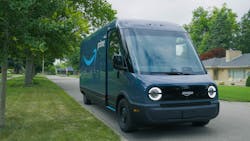Updated: Rivian Joins Tesla’s NACS Charging Network, SAE International to Develop Standards
Editor's note: This story originally ran June 21, 2023. Editors updated it on June 27 to reflect SAE International's announcement that day that it will develop a standard for Tesla's NACS charging system for future vehicles.
Rivian Automotive has become the latest EV maker to begin using Tesla’s superchargers. The company announced it had signed the agreement with Tesla and its R1T and R1S vehicles would be able to plug in via adapter by as early as next spring. The North American Charging Standard (NACS) charge ports will be incorporated into Rivian trucks in 2025, including on the incoming R2 platform.
RJ Scaringe, founder and CEO of Rivian, said the collaboration would “help advance the world toward carbon neutrality.”
“The adoption of the North American Charging Standard will enable our existing and future customers to leverage Tesla’s expansive Supercharger network while we continue to build out our Rivian Adventure Network. We look forward to continuing to find new ways to accelerate EV adoption,” he said.
The news comes after back-to-back announcements earlier this month that Ford Motor Co. and General Motors Corp. would also begin using the Tesla Superchargers on roughly the same timeline as Rivian. It seems to mark a shift from the combined charging system (CCS) that has been hailed as the standard in the United States and abroad. The system was originally supported by a group of car manufacturers, including Ford and GM.
In comparison, NACS is Tesla’s own charging ecosystem with a charging port and connector that is half the size and twice as powerful as CCS. It has nearly 2,000 DC superchargers across the United States and Canada, all of which are only usable with a NACS port. As Tesla is also the largest EV maker in the country by some margin, NACS vehicles outnumber CCS two-to-one.
On June 27, SAE International, the influential engineering group formerly known as the Society of Automotive Engineers, announced that it will quickly develop global standards for the NACS, making it easier for other automakers to adopt Tesla's plug for future vehicles.
“Standardizing the NACS connector will provide certainty, expanded choice, reliability and convenience to manufacturers and suppliers and, most of all, increase access to charging for consumers,” said Frank Menchaca, president, of SAE's Sustainable Mobility Solutions.
David L. Schutt, CEO, SAE International, added, "These efforts will contribute substantially to SAE’s commitment to secure, clean and connected transportation, accessible to everyone."
Tesla first announced it would open its superchargers to non-Teslas in November 2022 as it sought to make its charger the true standard. It is also part of a deal with the White House to make the company eligible for $7.5 billion under the Bipartisan Infrastructure Law for EV charging infrastructure as it plans to double its supercharger network by late 2024. It was not eligible before under the law’s stipulations that the company had to have non-proprietary charging connectors and an open access payment method for all members of the public to use. It cleared the second hurdle by opening the Tesla app to non-Tesla drivers.
Car makers aren’t the only ones switching to NACS. Charging station manufacturers ChargePoint Holdings Inc., Blink Charging Co., EVgo Inc. and Wallbox NV each announced last week that they would have chargers compatible with the system.
ChargePoint and Blink, which make charging equipment and operate charging stations, already had NACS-compatible equipment in development. For ChargePoint, it’s an adapter, while Blink has a new DC fast charger for both NACS and CCS in the final design phases.
Wallbox also plans to integrate Tesla connectors into its upcoming DC fast charger, Supernova, which will enter North America later this year.
EVgo, which has been integrating Tesla chargers with its stations since 2020, will make NACS standard on future deployments and more will be added to some existing ones.
"EVgo's long-term success is directly tied to EV adoption at scale, our fantastic partnerships, and our continued technology leadership. All of our automaker partnerships continue apace, and the dozens of new electric vehicle models coming to market in combination with the expansion of access to charging for NACS and CCS vehicles will help take us even closer to making our vision of Electric for All a reality,” said Cathy Zoi, CEO of EVgo.
